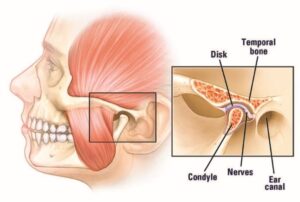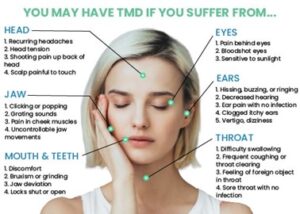TMJ- Ouch! Invite Health can Help

TMJ
Dr. Claire Arcidiacono, ND
No conversation about oral health would be complete without talking about TMJ disease or temporomandibular joint disorder. In simple terms, this is TMJ pain. While you may have heard people say that they have TMJ pain do you really know what that even means? We’ll let us get into it, shall we?
What is the temporomandibular joint (TMJ)? It is the joint between the lower jawbone (mandible) and the temporal bones of the skull. There is 1 of these joints on each side of your head. These joints work together to allow your jaw to move up/ down, side to side and forward/ backward. When you open your mouth to eat, talk or even just laugh you are using the temporomandibular joint or TMJ to do so. As you can guess, these joints get plenty of use. Please look at the attached picture for a better idea of just where this joint is. (1)

TMJD is more common than you might expect. In fact, it is estimated that anywhere from 10-35 million people in the US are affected by this condition at any time. This is more common in women in fact, for every one man who has TMJ nine women have the disorder! (1)
What are some of the symptoms of TMJ disorders that you may experience? TMJ disorders can cause a clicking or grating sensation when you open your mouth. There may be pain or tenderness of the jaw or even 1 or both of the TMJ joints. You may notice that there is an aching pain in or around your ear. There may be an aching pain in your face. Chewing may be difficult or even painful. In some cases, the joints may lock, making it hard to open or close your mouth. (2) In addition to symptoms in the mouth area or facial area you may notice certain systemic symptoms. There may be pain in the neck area, shoulders, and even chronic headaches. There may be vision changes, dizziness, tinnitus, and a feeling that your bite is “off.” (2) Please see the attached picture for a complete look at the symptoms that can occur. (3)

What are some of the most common risk factors for TMJ disorders? Having arthritis or certain connective tissue disorders can increase your risk. Having an injury to the jaw is also a risk factor. Anyone who grinds or clenches their teeth can damage their TMJ. (1) Certain autoimmune diseases can also trigger TMJ disease. Anything that damages the TMJ can lead to TMJ disease. For example, having an infection in the mouth can lead to joint damage. Certain dental procedures can lead to joint damage. Even having a breathing tube inserted before surgery can overextend the jaw leading to damage. Certain medications can also trigger joint damage and lead to TMJ disease. These medications can include SSRIs, antipsychotics, ADHD meds, Parkinson’s disease meds and even osteoporosis drugs. Studies have found that there may be a hormonal and genetic component to TMJ disease. (2)
So what can you do to help reduce the signs of TMJ disorder?
- Turmeric has been found to have numerous benefits for TMJ disorders. Studies have found that it can help to reduce inflammation which triggers pain and leads to damage to the joint. Studies have also found that turmeric can help to protect the cartilage in the joint from damage. (4) Please see Invite’s Biocurcumin 5 Loxin and Turmeric with Ginger.
- Ginger has been found to help to reduce inflammation which can be helpful in reducing both pain and damage to the joint! (5) Please see Invite’s Turmeric with Ginger and Osteo-Lube!
- Omega 3s have been found to help reduce the damage associated with TMJ disorders. (6) Please see Invite’s Krill Oil and Fish Oil.
- Magnesium is important for those with TMJ disorders for a number of reasons. It can help with relaxing muscles. It can help reduce stress. Interestingly studies have found that in up to 22% of those with TMJ disorders there is a magnesium deficiency. (7) Please see Invite’s Magnesium Citrate and Glycinate. For a topical formula you can use Bio Avail Magnesium and mix it into a menthol rub.
- Collagen has been found to help reduce the symptoms associated with TMJ disorders. (8) Please see Invite’s Collagen Hx and Collagex HA as well as our chewable Collagen gummies!
Our product highlight will be Osteo-Lube!
Sources:
- https://tmj.org/living-with-tmj/basics/
- https://www.mayoclinic.org/diseases-conditions/tmj/symptoms-causes/syc-20350941
- https://attunemassagetherapy.com/blog/signs-and-symptoms-of-tmj-tmd/
- https://pmc.ncbi.nlm.nih.gov/articles/PMC7192998/#:~:text=Temporomandibular%20joint%20osteoarthritis%20(TMJ%20OA,articular%20cartilage%20from%20progressive%20degradation.
- https://pmc.ncbi.nlm.nih.gov/articles/PMC9229778/
- https://pubmed.ncbi.nlm.nih.gov/32122630/
- https://www.fairfieldsleeptmj.com/tmd-magnesium-and-seasonal-affective-disorder-sad#:~:text=Magnesium%20Difficiency%20Makes%20TMD%20Worse,and%20its%20side%20effects%20worse.
- https://www.renewskinco.com/blogs/i/collagen-supplements-for-tmj#:~:text=In%20one%20study%2C%20participants%20with,when%20compared%20to%20a%20placebo.
